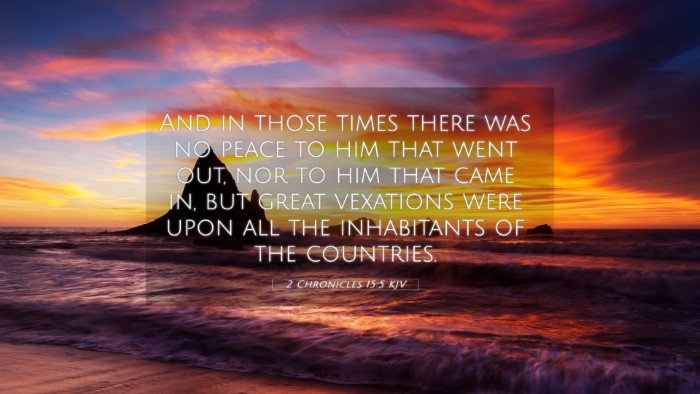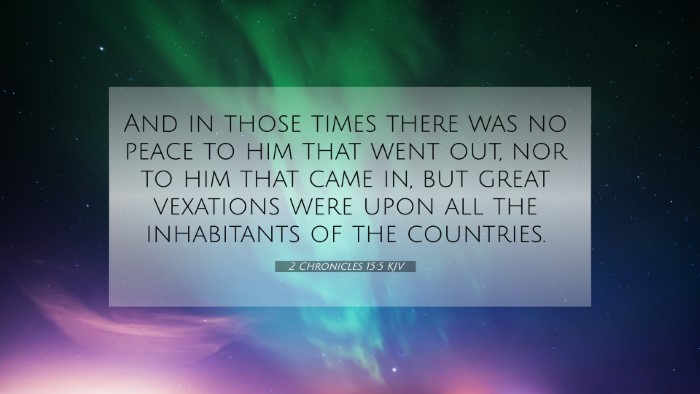Understanding 2 Chronicles 15:5
2 Chronicles 15:5 (KJV): "And in those times there was no peace to him that went out, nor to him that came in, but great vexations were upon all the inhabitants of the countries."
This verse reflects a period of turmoil and unrest among the people of Judah during the reign of King Asa. The deeper meaning found in the public domain commentaries provides insight into the spiritual and social context of this passage.
Context and Background
The book of Chronicles is a vital historical account that focuses on the Davidic line and the kingdom of Judah. Chapter 15 deals with Asa's reforms and the return to the worship of the true God, which is preceded by a time of instability and fear among nations.
Terminology and Key Themes
- No Peace: Indicates a lack of security and well-being, suggesting divine disfavor or judgment.
- Great Vexations: Refers to extreme distress and anguish, a consequence of turning away from God.
- Inhabitants of the Countries: Demonstrates that the turmoil extended beyond Judah, indicating a broader national crisis.
Commentary Insights
Matthew Henry's Commentary
Matthew Henry points out the absence of peace during a time when the people were suffering great distress. He notes that when nations turn away from God, they are subject to chaos and division.
Albert Barnes' Notes on the Bible
Albert Barnes emphasizes the notion that peace is contingent upon righteousness and divine favor. The spiritual disarray among the nations leads to political and social turmoil.
Adam Clarke's Commentary
Adam Clarke highlights that the physical and spiritual distress faced by the inhabitants reflects their moral condition and the judgments that come from forsaking the Lord.
Bible Cross-References
This verse interconnects with several other passages that elaborate on the themes of peace, divine judgment, and national distress. Some relevant cross-references include:
- Isaiah 48:22: "There is no peace, saith the Lord, unto the wicked."
- Hosea 4:6: "My people are destroyed for lack of knowledge..." emphasizing spiritual ignorance leading to distress.
- Jeremiah 14:19: "Hast thou utterly rejected Judah? Hath thy soul loathed Zion?" This depicts the consequences of divine rejection.
- Proverbs 28:28: "When the wicked rise, a man is hidden: but when they perish, the righteous increase."
- Psalm 119:165: "Great peace have they which love thy law: and nothing shall offend them."
- Micah 3:5: "Thus saith the Lord concerning the prophets that make my people err..." showcasing the dangers of false guidance.
- Matthew 10:34-36: "Think not that I am come to send peace on earth..." reflecting the spiritual division created by unfaithfulness.
- James 3:18: "And the fruit of righteousness is sown in peace of them that make peace."
- Dani 9:12: "And he hath confirmed his words, which he spake against us, and against our judges that judged us..." relating judgment with divine truth.
- Zechariah 8:10: "For before these days there was no hire for man, nor any hire for beast..." illustrating societal collapse.
Thematic Connections
This verse's primary themes resonate throughout the Scriptures, illustrating the consequences of disobedience and the assurance of divine peace for those who align themselves with God's will. It reminds us of the spiritual implications of societal unrest and serves as a call to return to God for restoration and peace.
Practical Applications
Understanding this verse encourages modern readers to reflect on the relationship between personal spirituality and societal well-being. In a world where turmoil can often feel overwhelming, the teachings of this passage emphasize the importance of seeking peace through righteousness and faith in God.
Conclusion
In summary, 2 Chronicles 15:5 serves as a powerful reminder of the spiritual realities that impact our lives and societies. The insights from public domain commentaries help us grasp the significance of this verse and its connections to broader biblical themes.
For individuals studying the Bible, utilizing tools for Bible cross-referencing, such as concordances and cross-reference guides, can greatly enhance understanding. This practice allows believers to explore thematic Bible verse connections and facilitate comparative Bible verse analysis, enriching their spiritual study and application.







